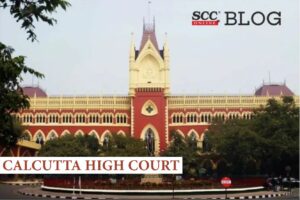Calcutta High Court: In a petition challenging the appointment of sole Arbitrator by the respondent, Shekhar B. Saraf, J., held that merely because an arbitration clause provides for an illegal method of appointment of arbitrator, it does not come to an end and after removing the illegal portion of the arbitration clause, Courts can retain the remaining clause to give effect to the intention of the parties.Facts of the Case
Petitioner and respondent entered into a loan agreement amount of Rs. 5,50,00,000/- dated 29.08.2016. Due to alleged failure to repay the loan amount by the petitioner, respondent issued the notice of arbitration and unilaterally appointed the sole arbitrator.
The petitioner challenged the unilateral appointment of the sole arbitrator under S. 14 of the Arbitration and Conciliation Act, 1996 (‘the Act'). The arbitrator adjourned the arbitration sine die after learning the fact of the challenge of his appointment by the petitioner.
Petitioner's Contention
The petitioner contented that since the sole Arbitrator was unilaterally appointment by the respondent, he become de jure enabling him to perform his function under S. 14(1)(a) of the Act. The arbitration agreement itself becomes invalid as a portion of arbitration agreement provides for unilateral appointment of arbitrator making it ex-facie illegal and invalid. Moreover, the loan agreement itself involves the alleged matter of fraud and forgery, therefore substitution of arbitrator should not be allowed.
Court's observation
Relying on TRF Ltd. v. Energo Engineering Projects Ltd., (2017) 8 SCC 377 and Perkins Eastman Architects DPC v. HSCC (India) Ltd, (2019) SCC Online SC 1517 where it was held that an individual who has an interest in the outcome of a dispute also cannot nominate a sole arbitrator, the Court observed that indeed the Arbitrator was unilaterally appointed therefore, he becomes de jure unable to perform his functions and his mandated stands automatically terminated under S. 14 of the Act. The Court stated that
“The guiding principle is transparency, fairness, neutrality and independence in the selection process and hence, appointment of a sole arbitrator can either be with mutual consent of parties or by an order of the competent court. There can be no third way.”
While deciding the issue of whether the mandate of such an arbitrator, whose appointment is impermissible and illegal is automatically terminated under S. 14(1)(a) of the Act on account of being de jure unable to perform his functions, the Court relied on HRD Corpn. v. GAIL (India) Ltd., (2018) 12 SCC 471 and Bharat Broadband Network Ltd. v. United Telecoms Ltd., (2019) 5 SCC 755 where it was held that “… a case which falls under Section 12(5), Section 14(1)(a) of the Act gets attracted inasmuch as the arbitrator becomes, as a matter of law (i.e., de jure), unable to perform his functions under Section 12(5), being ineligible to be appointed as an arbitrator. This being so, his mandate automatically terminates, and he shall then be substituted by another arbitrator under Section 14(1) itself”.Thus, the Court held that where due to lack of inherent jurisdiction, the arbitrator does not have the power to decide on the objection regarding his ineligibility under S. 14(2) of the Act and the same has to be dealt with only by this Court.
The Court relied on Vidya Droalia v. Durga Trading Corpn., (2021) 2 SCC 1 and A. Ayyasamy v. A Paramasivam, (2016) 10 SCC 386, where it was observed that mere allegation of fraud is not sufficient to detract parties from the obligation to submit their disputes to arbitration and negated the contention of petitioner i.e. since the agreement itself is forged and fabricated and in the absence of any loan agreement, there exists no arbitration agreement, therefore this Court cannot appoint a substitute arbitrator under the Act.
The Court also rejected the argument of the petitioner that the entire arbitration agreement becomes illegal or invalid when the procedure of appointment is illegal.
Conclusion
Appointing the sole arbitrator to resolve the disputes between the parties, the Court held that the Court while exercising powers under S. 14 of the Act for appointing a substitute arbitrator will be guided by the principles of S. 11 of the Act.
[Yashovardhan Sinha HUF v. Satyatej Vyapaar (P) Ltd., 2022 SCC OnLine Cal 2386, decided on 24-08-2022]
*Ritu Singh, Editorial Assistant has put this report together.

